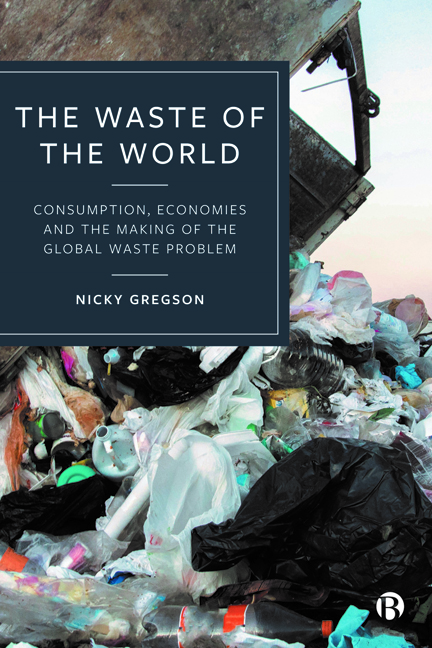Book contents
- Frontmatter
- Contents
- Acknowledgements
- Preface
- 1 The Global Waste Problem and How to Think about It: Or, how to understand the ‘too much waste’ problem
- 2 Discard, Social Order and Social Life: Or, discard is foundational to understanding waste
- 3 Consumption, Consumer Practices and Consumer Discard: Or, how consumer discard relates to economies
- 4 Conduits, Value Regimes and Valuation: Or, following consumers’ discarded things
- 5 Recommodifying Discard: Or, the challenges of turning discard into an economic good
- 6 Waste, Money and Finance: Or, how turning discard into waste turns waste into an energy resource and an asset
- 7 Future Directions: Or, rewiring waste through the three Ds (decarbonization, digital and discard)
- Notes
- References
- Index
3 - Consumption, Consumer Practices and Consumer Discard: Or, how consumer discard relates to economies
Published online by Cambridge University Press: 18 January 2024
- Frontmatter
- Contents
- Acknowledgements
- Preface
- 1 The Global Waste Problem and How to Think about It: Or, how to understand the ‘too much waste’ problem
- 2 Discard, Social Order and Social Life: Or, discard is foundational to understanding waste
- 3 Consumption, Consumer Practices and Consumer Discard: Or, how consumer discard relates to economies
- 4 Conduits, Value Regimes and Valuation: Or, following consumers’ discarded things
- 5 Recommodifying Discard: Or, the challenges of turning discard into an economic good
- 6 Waste, Money and Finance: Or, how turning discard into waste turns waste into an energy resource and an asset
- 7 Future Directions: Or, rewiring waste through the three Ds (decarbonization, digital and discard)
- Notes
- References
- Index
Summary
In this chapter, the focus shifts from recognizing that discard is foundational to being human, and thus unavoidable, to seeing how consumer discard, and acts of discarding, are baked in to many economies.
In this regard, I want to go beyond the largely theoretical accounts in the social sciences that see discard as an inevitable aspect of economic organization, particularly under capitalism. To be clear, I am not dismissing the power of these arguments. There is much that is of merit in them. Not least is that they establish key general principles that help explain why waste is an endemic part of capitalist economic activity. I begin the chapter, therefore, by outlining these approaches and how they see waste, before going on to show why these accounts are less helpful to understanding consumer discard.
Marxist and neo-Marxist readings of economy recognize that all primary and manufacturing processes involve transformations of the material world brought about by (human) labour, and that they also entail material transformations. But, just like the firms they analyze, mostly these accounts focus on the end point of the production process: the commodity. This is because here, labour (and the commodity that is the result of production) is seen to be the means to value creation for capitalist firms. Yet, in highlighting the overarching significance of commodities, these accounts also flag the relative insignificance to many capitalist firms of the inevitable material leftovers and residues of production processes – or the stuff that, while integral to production processes, never realizes the commodity form. They also flag that residues have mostly been seen as waste, that is, as stuff of zero value. This helps to explain why the history of how firms have dealt with residues is characterized by ‘dump and disperse’, and never mind the consequences. When stuff is seen to be of zero value, it is but a short step to that stuff being discarded, and discarded as waste. Examples of the residues of economic activity that over time have been dumped in this way include the tailings that come from mining operations and ore preparation; the husks, shells, skins, stones and pips that are stripped from agricultural crops prior to their becoming an agricultural commodity; and an array of remainders from the various chemical and industrial processes that produce basic feedstocks for core areas of manufacturing.
- Type
- Chapter
- Information
- The Waste of the WorldConsumption, Economies and the Making of the Global Waste Problem, pp. 52 - 75Publisher: Bristol University PressPrint publication year: 2023



